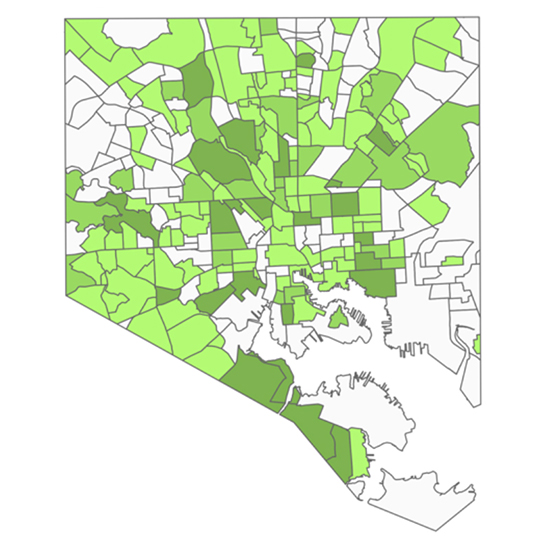Neighborhood Data Project Probes Environmental Challenges
Even with diminished federal funding, organizers of the Baltimore-Social Environmental Collaborative plan to empower community members to keep collecting data and putting it to use.
Johns Hopkins UniversityEst. 1876
America’s First Research University


The Baltimore Social-Environmental Collaborative (BSEC) is a Department of Energy Urban Integrated Field Lab program designed to generate the science needed for informed energy investments and extreme weather resilience in Baltimore. In doing so, BSEC contributes to action plans for Baltimore that improve the well-being of residents across the region. Working with businesses, local and state government representatives, and community organizations, BSEC scientists produce the decision-relevant science needed to address local priorities and needs. As data is gathered and findings discovered, the work evolves to answer questions our partners identify.
Learn More
BSEC collects a variety of observations across the city. These observations allow us to analyze climate dynamics in Baltimore City at the city and neighborhood scale to understand issues such as urban heat island, urban flooding, and air pollution.
Learn MoreNeighborhood Data Project Probes Environmental Challenges
Even with diminished federal funding, organizers of the Baltimore-Social Environmental Collaborative plan to empower community members to keep collecting data and putting it to use.
Potential Crisis Looms with Loss of Environmental Health Research
How extreme weather affects urban areas "is currently a big unknown," said Zaitchik, principal investigator of the now-defunded DOE research project known as the Baltimore Social-Environmental Collaborative.
BSEC April 2025 Quarterly Research Update
BSEC research work over the past four months has spanned all scientific themes in the project
BSEC January 2025 Quarterly Research Update
Over the past several months, most BSEC research theme teams have focused on data analysis and model evaluation related to summer data collection. This has included substantial studies of the air pollution, extreme heat, and vegetation datasets collected in collaboration with Equitable Pathways Steering Committee (EPSC) members and other community organizations.
Coastal-Urban-Rural Atmospheric Gradient Experiment (CoURAGE)
Understanding the mechanisms governing the urban atmospheric environment is critical for informing urban populations regarding the impacts of climate change and associated mitigation and adaptation measures.
How Johns Hopkins Scientists and Neighborhood Groups Model Climate Change in Baltimore
Zaitchik and his graduate assistant, Ali Eyni, prepared to ride bicycles on a 17-mile loop of the city, measuring maximum temperatures at the height of a blistering heat wave to record temperature variations between neighborhoods with little tree canopy and those with better tree cover and more green spaces.